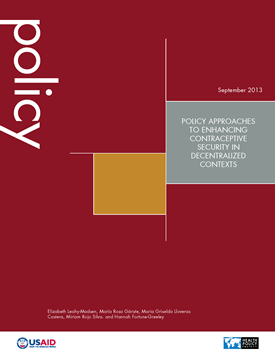The Health Policy Project ended in 2016. Work continued under Health Policy Plus (HP+) until 2022.
PUBLICATION
Author(s): Elizabeth Leahy Madsen, María Rosa Gárate, Maria Griselda Lloveras Castera, Miriam Rojo Silva, and Hannah Fortune-Greeley
Primary Language: English
Date: 9/30/2013
Abstract:
This report describes two pilot technical assistance programs implemented by the USAID-funded Health Policy Project to strengthen policy development and implementation related to contraceptive security at decentralized levels in Peru and the Dominican Republic. Over a two-year period, three regional and municipal committees engaged a multisectoral group of political leaders, technocrats, civil society representatives, and healthcare providers to collaboratively assess policy and funding barriers related to family planning and design and implement solutions. The compilation of experience and results is intended to inform programs to strengthen contraceptive security at the decentralized level in other settings, whether through committees or other mechanisms. As decentralization continues to evolve in Latin America and other regions, it is critical to strengthen subnational capacity in the public sector and civil society to ensure that high-quality and equitable services are demanded, delivered, and monitored at all levels of the health system in a manner that promotes sustainability and local ownership.
Advocacy Capacity Development Civil Society Engagement Contraceptive Security Family Planning/Reproductive Health (FP/RH) Leadership Policy Report LAC


